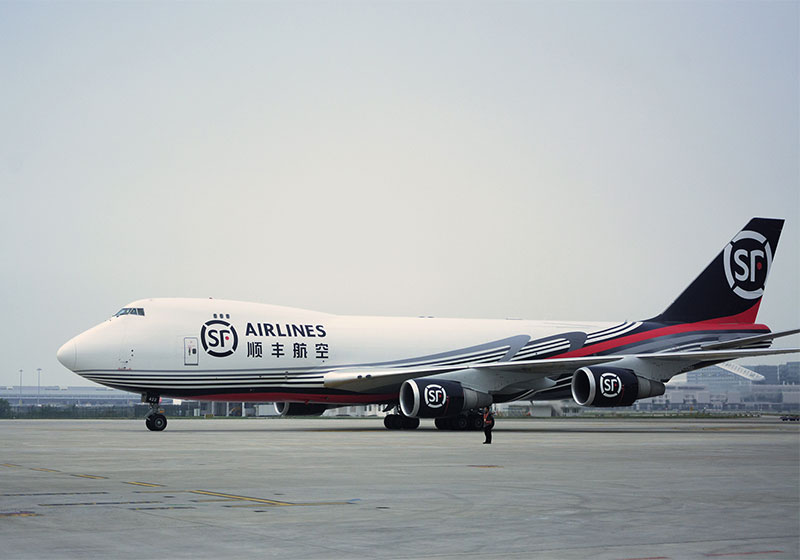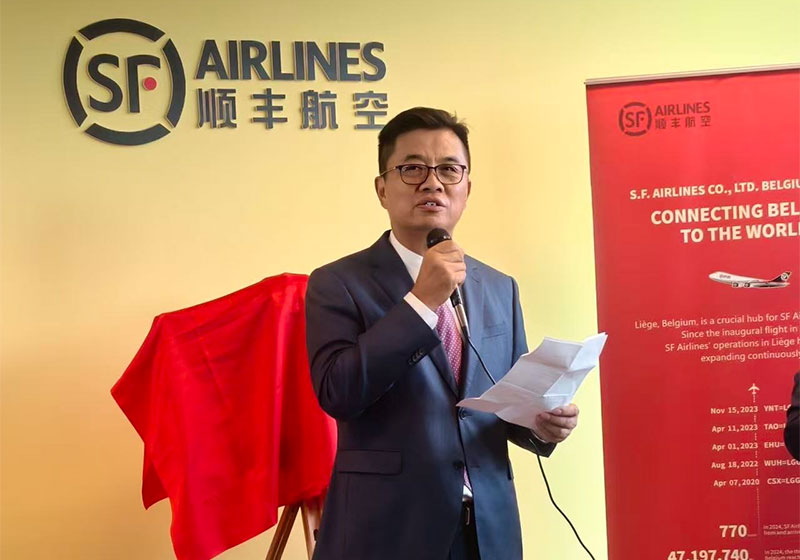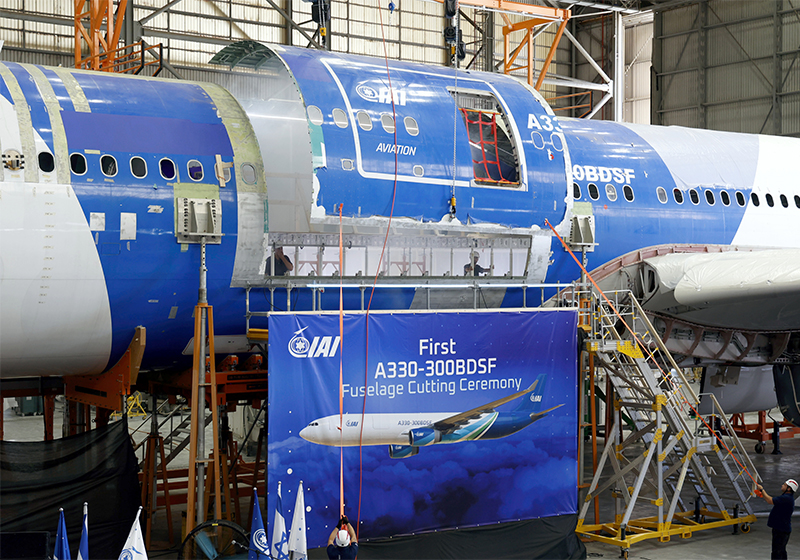SF Airlines is accelerating its global expansion with a strong strategic focus on Asia, backed by key initiatives such as the acquisition of Kerry Logistics and the development of Ezhou Huahu Airport, Asia’s first dedicated cargo airport. By leveraging advanced technologies, automation, and drone logistics, SF is enhancing operational efficiency and customer service. Its joint business agreement with Etihad Airways further strengthens cargo capacity, network reach, and service quality across Asia, the Middle East, and beyond. The partnership is especially critical in serving the fast-growing cross-border e-commerce sector and reinforcing UAE-China trade routes through optimized connectivity and infrastructure.
1. What are SF Airlines' top strategic priorities for international expansion?
Li Sheng- SF Airlines has placed Asia as its top strategic priority for international expansion. Historically, SF Express focused mainly on the domestic Chinese market over its 30-year history. However, in recent years, growing demand from its clients to expand globally—particularly within Asia—has shifted this focus. The Asia-Pacific region now serves as the central pillar of SF Airlines' international strategy. A major step in this direction was the acquisition of Kerry Logistics in 2021, a leading logistics company in the Asia-Pacific. SF aims to leverage Kerry’s network and operational synergies to deliver superior logistics solutions and create value for its clients in the region. This approach marks a decisive step in transitioning from a domestically focused entity to a major global logistics player.
2. How will Ezhou Huahu Airport enhance your global cargo operations?
Li Sheng- Ezhou Huahu Airport plays a critical role in SF Airlines’ global expansion efforts. It is China and Asia’s first dedicated cargo airport and holds the distinction of being the first such airport globally. Located strategically, this high-efficiency facility supports SF’s vision of focusing on high-end logistics and express delivery. Domestically, it serves as a central hub for SF’s extensive network, while internationally, it has rapidly evolved into a key gateway. In the past two years, Huahu Airport has achieved top rankings in terms of throughput volume and route connectivity. Its ability to efficiently process cargo, coupled with strong customs clearance infrastructure, significantly enhances SF’s capacity to meet international demands and facilitate cross-border trade.
3. How is technology improving your cargo efficiency and service?
Li Sheng- Technology has always been a core competency for SF Airlines. From the company’s inception, SF has pioneered the use of advanced tech in its logistics operations, being the first in China to equip all couriers with PDAs for real-time information input. SF was also the first to offer full parcel visibility to its clients. At Ezhou Huahu Airport, cutting-edge technology has been embedded into the facility’s infrastructure from the ground up. The airport’s sorting facility was designed using world-class logistics engineering and developed in-house to integrate systems, AI, and automated sorting equipment. As SF enters a new era, it is actively incorporating emerging technologies such as artificial intelligence and smart logistics into its services, ensuring enhanced operational efficiency, accuracy, and customer satisfaction.
4. What role will drones play in your future logistics network?
Li Sheng- Drones are expected to play an increasingly important role in SF Airlines’ future logistics framework, especially for last-mile delivery in specific scenarios. With the development of drone technology and favourable regulatory support from the Civil Aviation Administration of China (CAAC), SF is exploring opportunities to use drones more widely. SF is already a leader in drone deployment for logistics within China, particularly in last-mile delivery. As technology matures and regulations evolve, the company expects drone-based logistics to become a key supplement to its network, offering faster, more flexible delivery solutions in remote or hard-to-reach areas.

5. What type of services will be expanded as a result of this agreement with Etihad Airways?
Li Sheng- The joint business agreement (JBA) between SF Airlines and Etihad Airways allows for significant expansion across three key service areas: capacity, network coverage, and customer service. First, both companies can optimize cargo capacity by pooling their respective fleets—Etihad with its strong presence in Europe and the Middle East, and SF in China and Asia. Second, the combined network coverage will enable seamless connectivity between Asia and the Middle East, offering better options for clients. Finally, both parties bring complementary strengths: Etihad’s experience in working with global freight agents, and SF’s established relationships with domestic Chinese clients. The synergy between their super hubs will enable customized logistics solutions that meet evolving client needs.
6. How will the joint venture with Etihad impact UAE-China trade routes?
Li Sheng- The joint venture significantly strengthens trade routes between China and the UAE. The weekly capacity has grown from 200 metric tons at the start of the partnership to over 1,000 metric tons now, a fivefold increase. A substantial share of this capacity is distributed within Etihad's network, while the rest is cleared and delivered locally within the UAE. The strong bilateral relationship between China and the UAE, particularly in trade, underscores the importance of this route. Abu Dhabi, traditionally not a major logistics hub for Chinese firms, is now becoming increasingly relevant and attractive. This venture not only facilitates smoother trade flows but also positions Abu Dhabi as a preferred destination for Chinese logistics demand, both in B2B and B2C segments.
7. Why is the growth of cross-border e-commerce relevant to this joint venture?
Li Sheng- The rise of cross-border e-commerce has had a transformative impact on global airfreight markets and is a driving force behind the SF-Etihad joint venture. E-commerce has introduced a surge in demand for small-volume, high-frequency shipments to diverse and non-traditional destinations. No single logistics company can meet this demand alone, which makes partnerships essential. Etihad’s flexible network and geographic reach, combined with SF’s technological edge and strong domestic client base, are ideally suited to serve the e-commerce market. By working together, both companies can offer agile, scalable solutions that match the fast-paced nature of e-commerce logistics. This partnership ensures they remain competitive in a market where customer expectations around speed and visibility are continually rising.
8. How will the joint venture improve global air cargo connectivity?
Li Sheng- The joint venture dramatically enhances global air cargo connectivity by combining the strengths of two major logistics players. It integrates Etihad’s vast network in Europe, the Middle East, and Africa with SF’s dominant presence in China and Asia. This synergy enables both companies to offer a broader, more efficient route structure with higher service frequency. The partnership also allows for better utilization of super hubs, optimized cargo flow, and improved customs processes. With the added infrastructure, advanced technology, and complementary capabilities, this joint venture enables end-to-end cargo solutions across continents, boosting service reliability, expanding market reach, and creating more value for international shippers.






